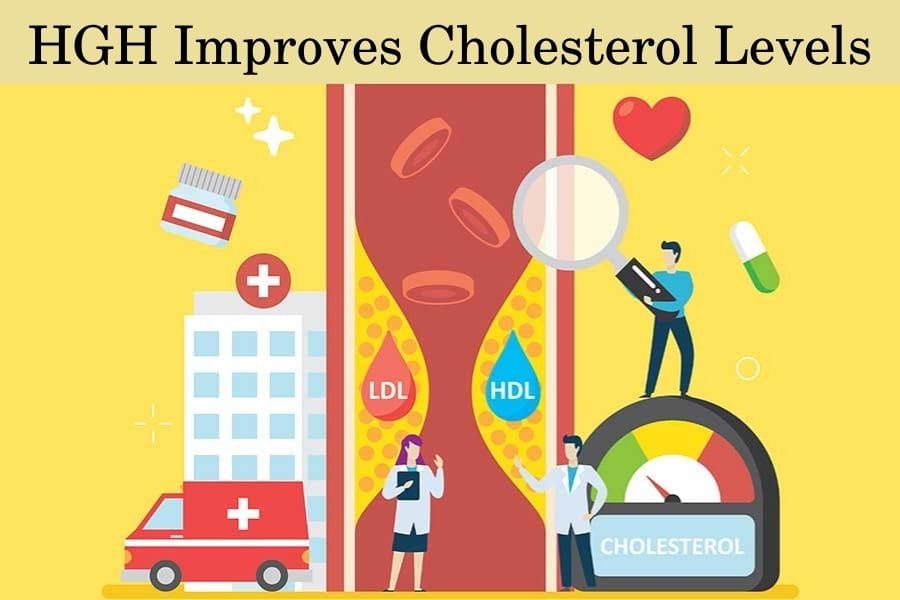If you have GHD (growth hormone deficiency) then you may be at an increased risk for having a heart attack or stroke.
That is because up to 45% of the patients experience high cholesterol levels which speed up atherosclerosis and increase the risk for premature death.
In fact, GHD may prevent your cholesterol levels from decreasing even when following a healthy diet and exercise regime.
Furthermore, GHD has a negative effect on the function of your heart. The deficiency is associated with elevated blood pressure and decreased capacity of the heart to pump blood throughout your body.
Initiating HGH therapy in time can help improve cholesterol levels, blood pressure, and heart function in order to successfully prevent heart failure and other serious complications.
HGH treatment improves cholesterol levels
The growth hormone affects your cholesterol levels by increasing the LDL-receptor activity in your liver. This in turn reduces the levels of LDL in the blood.
LDL (also known as the “bad” cholesterol) is a class of lipoproteins that carry cholesterol in the blood which is why increased LDL levels contribute to atherosclerosis.
Studies have confirmed that HGH therapy can restore the normal activity of the LDL receptors in GHD patients and lower cholesterol levels. Long-term therapy appeared to be most effective in improving the lipid profile in older patients and those with adult-onset GHD.
HGH increases HDL “good” cholesterol levels
In addition, growth hormone treatment resulted in increased HDL levels. That is the “good” cholesterol since the lipoprotein HDL removes the cholesterol molecules from the blood.
Therefore, HGH therapy may help improve your ratio between total and HDL cholesterol which is one of the most informative indicators for cardiovascular health risk.
Also, HGH injection can speed up fat loss and help improve your body composition. Growth hormone has a predominant effect on the fat that accumulates around your waist and internal organs.
This type of fat is called visceral and it is an independent risk factor for metabolic problems and heart disease. By reducing visceral fat, HGH can indirectly lower your LDL levels, improve your lipid profile and slow down the progression of atherosclerosis.
HGH improves cardiac function
HGH has a direct effect on the heart muscle. Growth hormone therapy can help preserve the muscle mass of your heart and support its function.
That is thanks to the anabolic effects of insulin-like growth factor 1 (IGF-1) which mediates all of the benefits of HGH for growth.
In addition, growth hormone injections can help lower blood pressure and reduce the thickness of the blood vessels which supply the heart.
The therapy may also help support cardiovascular function in patients with chronic heart failure. 3-6 months on HGH injections improve several cardiovascular parameters such as the muscle mass of the heart and its pump volume.
How long does it take for HGH to improve cholesterol levels?
Studies have reported that HGH therapy can reduce LDL levels in patients with hypercholesterolemia as soon as the 3rd month.
On the other hand, trials with GHD patients report that it may take 6-12 months of therapy for the improvement in both LDL and HDL levels to reach significance. The benefits were sustained for the whole period of the study which lasted 8 years
Yet the benefits of HGH therapy are not permanent, since it cannot restore the normal function of the pituitary gland in GHD patients. That’s why discontinuing the therapy puts you once again at an increased risk of complications.
What else do you get with improved cardiac and lipoprotein parameters?
Improved cardiovascular health can help increase your exercise capacity, sexual performance, and quality of life. What is more, better heart health will reduce your risk of heart attack or stroke and possibly extend your life.
For male patients, lower cholesterol levels will also improve erectile function. That is because high LDL and atherosclerosis is the main contributor to erectile problems and impotence.
Therefore, improving the health of your cardiovascular system will not simply add years to your life, but also “life to your years.”
Get a free consultation with our medical expert for any questions about hormone replacement therapy

